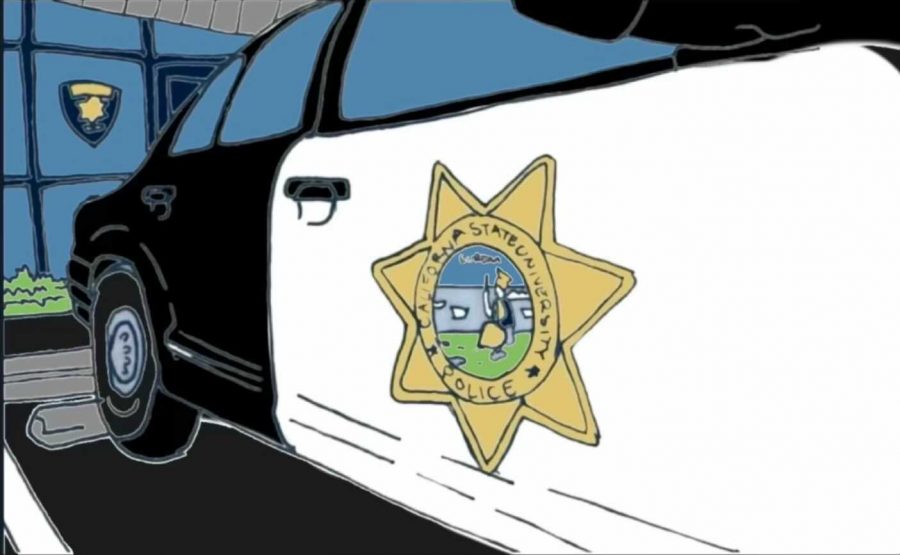
A police car sits in front of the University Police Department station on Tuesday, June 2, 2020. (Original photograph by Harika Maddala, Illustration by Kyran Berlin / Golden Gate Xpress)
SF, UPD to expand support services for sexual assault survivors
Through partnerships with agencies on and off campus, District Attorney Chesa Boudin expands resources for survivor support and advocacy
Sep 1, 2021
Trigger Warning: This article includes mentions of sexual assault and traumatic events.
Survivors of sexual assault, violent crimes and hate crimes reported on and off campus will now have access to expanded services through a new partnership among campus and city agencies.
In a press release distributed on Tuesday, San Francisco District Attorney Chesa Boudin announced a citywide expansion of services for survivors through the DA’s partnership with the San Francisco Department of Public Health, San Francisco Police Department and SF State’s University Police Department.
The newly-implemented Memorandum of Understanding (MOU) also enhances UPD and SFPD training in trauma and cultural sensitivity, improves documentation of sexual assaults through information sharing, and formalizes updated procedures for reporting and investigating sexual assaults, according to the press release.
According to the SFDA’s office Victim Impact Survey Report conducted in 2020, of the 528 surveyed survivors of crime between 2015-2020, only 34% said they received survivor services through the Victim Services Division. Half of the survivors, when contacted by an advocate, “did not receive adequate information, guidance and referrals to services” from the Victim Services Division, according to the report.
The recommended remedies proposed in the report included increased financial and mental health resources for survivors, an expansion of options for victim service providers’ meeting and engaging with survivors of violence, and the development of a toolkit for trauma-informed services addressed in the new MOU.
“[The Memorandum of Understanding] provides that a victim will receive information and assistance accessing services like counseling, medical examinations, and, when the victim consents, a free sexual assault forensic examination (SAFE) regardless of the victim’s engagement with law enforcement,” the press release reads.
Among the updates to procedures addressing sexual assault, UPD will emphasize cross-training and a “trauma-informed” approach to care, said Reggie Parson, assistant vice president of Campus Safety and chief of police for SF State UPD.
“What we really want to do is really insulate the survivors, right? We want to really empower them to be able to make their decisions when they want to make those decisions,” Parson said in an interview with Xpress, giving an example of preventing survivors having to retell traumatic experiences throughout the reporting and accountability-seeking process. “The goal has been not to make the process itself a trauma, and to reduce trauma for survivors.”
The road to recovery after a traumatic event is a highly individualized process with individual needs, explained Stacy Peterson, an advocate and manager at The SAFE Place, a program through the university’s Counseling & Psychological Services providing free and confidential services to survivors of sexual violence.
“[The approach] is really allowing survivors to decide what accountability looks like for them,” Peterson said. “Whether that is reporting to UPD or San Francisco P.D., Title IX, or exploring alternatives for accountability that makes sense for them, and really putting that in the context of culture.”
According to a clery report summary from SF State’s Sexual Violence Prevention Collaborative, 24 rapes were reported on campus between 2017 and 2019, 13 of which occurred in campus residence. However, due to the epidemic of underreported sexual violence in the U.S., the actual statistics on campus assaults are likely much higher, according to the Rape, Abuse & Incest National Network (RAINN).
RAINN’s statistics on sexual violence victimization present that 21% of transgender and gender non-conforming college students, 18% of cisgender female students and 4% of cisgender male students have been sexually assaulted in their lifetime.
Despite this, only 20% of college age females and 32% of college age non-females choose to report instances of sexual assault, and more than 2 out of every 3 sexual assaults go unreported, according to the same RAINN findings.
Although there are a variety of reasons why instances of sexual assault go unreported, some of the most common reasons include fear of retaliation and the belief that police wouldn’t provide adequate help, according to RAINN. Through expansion of services in San Francisco, the co-founding agencies of the MOU seek to close the gap in reporting.
“Sexual violence is an underreported crime; too often survivors of sexual assault are reluctant to come forward and fear that their needs will not be centered,” Boudin stated in the press release. “This partnership will help ensure that sexual assault survivors receive the trauma-informed support and services they need to heal.”
In interviews with Xpress, both Peterson and Parson stressed that there are a variety of options available to survivors of violence to find the support, advocacy and resources they need.
For more information on survivor services mentioned in this article, visit the District Attorney’s Victim Services Division website and The SAFE Place website.


